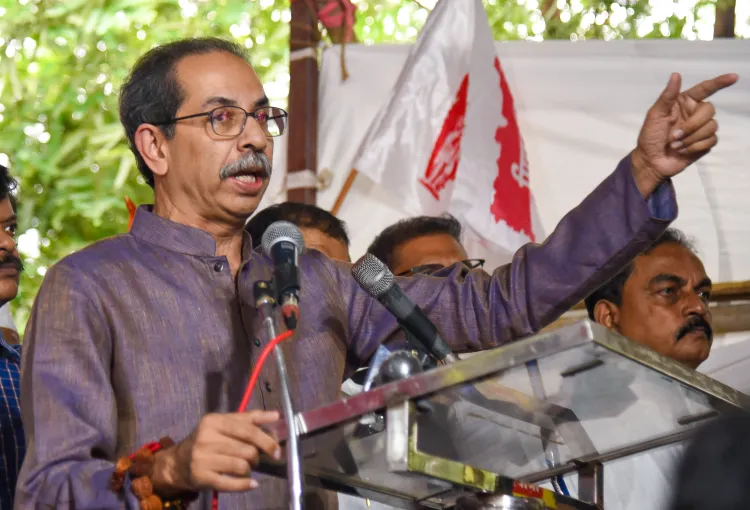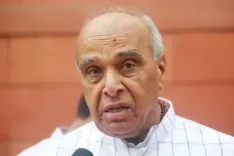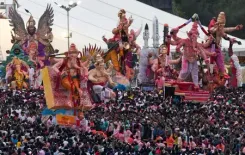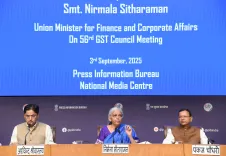Why is Shiv Sena(UBT) Criticizing BJP for Celebrating UNESCO Status of 12 Forts?

Synopsis
Key Takeaways
- UNESCO's World Heritage Site status for 12 forts is a significant achievement for Maharashtra.
- The Thackeray faction criticizes BJP for politicizing the celebrations.
- Shivaji Maharaj's forts are vital cultural assets that need preservation.
- The article raises concerns about the current economic situation in Maharashtra.
- There is an ongoing struggle for the Marathi language and identity.
Mumbai, July 14 (NationPress) Shiv Sena(UBT) applauded UNESCO’s decision to bestow World Heritage Site status on 12 forts constructed by Chhatrapati Shivaji Maharaj, emphasizing it as a remarkable achievement for Maharashtra and the Marathi community. However, the Thackeray faction expressed disapproval towards the BJP's initiative to hold celebratory events in light of this announcement.
In its editorial piece in Saamana, Shiv Sena(UBT) remarked that the BJP seems “designed” for such 'celebrations' and questioned its ability to safeguard the World Heritage Site status as well as the legacy of Chhatrapati Shivaji.
“Chhatrapati Shivaji Maharaj did not construct palaces but rather fortified structures to defend Swarajya. These forts are invaluable assets of Swarajya. Thus, their significance in the historical and cultural narrative of Maharashtra is unquestionable. Shivaji was crowned at Raigad Fort, which also served as his capital. The role of these forts in his life and battles is profound. While the rulers of India celebrated festivals at these forts, neither Delhi nor Maharashtra made substantial efforts to protect this rich heritage,” stated the editorial.
Delving into Chhatrapati Shivaji’s struggle for Swarajya and his bravery, the Saamana asserted that Shivaji not only founded the state but also endeavored to fortify the economy of the Marathi state.
Taking a jab at the BJP-led administration, the editorial indicated that Maharashtra presently bears a debt of approximately Rs nine lakh crore. “Shivaji established the Marathi state and erected forts for protection. Consequently, incidents like Pathankot, Pulwama, and Pahalgam could not occur in Maharashtra during his reign. Similarly, the terrorists from Pahalgam were thwarted, just as Maharaj prevented Afzal Khan and others from escaping,” the editorial claimed.
“Shahiste Khan's fingers met their end in the Red Palace. The Maratha kingdom was not a bandit realm or a military dictatorship; it was a domain committed to the welfare of the people. Today, the Maharashtra that revels in the name of Shivaji Maharaj has devolved into a realm of bandits. They have sanctioned rampant looting, and these individuals are celebrating while performing Shiva aarti because Shivaji Maharaj's forts have been accorded world heritage status,” the editorial added.
Amidst the ongoing debates regarding the imposition of Hindi and the struggle for Marathi dignity, the Shiv Sena(UBT) asserted that the Marathi language represents the legacy of Shivaji Maharaj and his heirs. The Central government recognized Marathi as a classical language; however, within Maharashtra, the language and its people are losing their respect. The editorial emphasized that Shivaji's language is not being preserved.
“Even today, there are protests advocating for the preservation of Marathi, and in this context, UNESCO's decision emerged. BJP members have begun celebrating. A few months prior, Chhatrapati Shivaji's Bhavani sword was retrieved from the British Museum, and before the elections, these individuals conducted a political procession with that sword. What has become of that sword? Where is it now? Fundamentally, this sword is not the Bhavani sword as the government asserts. Historians claim that the state government is manipulating the emotions of Shivaji devotees, while the BJP is politicizing the sword. They have now announced plans to recover the sword of Nagpur's Raja Mudhoji. This BJP attempt to claim historical ownership is quite amusing,” the Thackeray faction’s mouthpiece quipped.
The Thackeray camp cautioned that if the government fails to preserve these 12 forts that have achieved World Heritage status, UNESCO may revoke this designation according to its regulations.
“In 2012, UNESCO designated the 'Western Ghats' as a World Heritage Site. The Western Ghats also represent historical heritage. Prominent environmentalist Dr. Madhav Gadgil has consistently warned that no construction should disrupt the Western Ghats' biodiversity. When the Western Ghats were named a World Heritage Site, all forts in that area were included. Yet today, hammers, bulldozers, and JCBs are being used destructively within the Western Ghats. Whether it’s raising the height of the Almatti Dam or enforcing the Shaktipeeth Highway, these hammers are being wielded against this World Heritage site, jeopardizing the very preservation that UNESCO aimed to uphold,” concluded the editorial.









